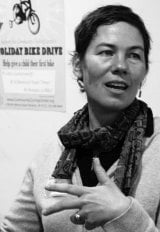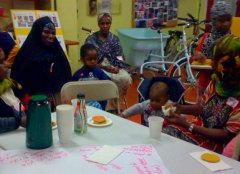“The people riding and making decisions about bicycles is a white, middle class group.”
— Alison Hill Graves, Community Cycling Center
The staff at Community Cycling Center, a 15 year old Portland-based nonprofit that aims to increase access to bicycling, has been doing some soul searching in the last few years.
In the process, community and programs director Alison Hill Graves says they started looking around the area they serve (a five-mile radius around their NE 17th and Alberta retail shop). “We saw a big divide in terms of who’s riding bikes and who isn’t.”
Or, to put it more plainly, “The people riding and making decisions about bicycles is a white, middle class group.”

The result: The CCC is undertaking an initiative it calls Understanding Barriers to Bicycling. The effort is funded by a grant from Metro that comes with a social justice stipulation.
Their first step in the process was to spend much of 2009 meeting with area leaders and organizations, particularly those that represent African Americans, African immigrants, Latinos/Hispanics, Native Americans, and Asian Americans. CCC staff told the groups about their work, and then asked questions about what might be preventing people from riding bicycles.
What they learned was eye opening, Graves said. “Affordability is a big barrier. But we also started hearing some deeper cultural, more challenging concerns, like that bicycling is an activity for white people or for Americans.”
“There’s the conversation about women going into bike shops and being intimidated. Think about being an immigrant… that option would never occur to them.”
Language and class both pose significant barriers. “There’s the conversation about women going into bike shops and being intimidated. Think about being an immigrant. We had conversations with people about where they’d buy a bike and they wouldn’t even think of going into a bike shop, that option would never occur to them.”
The CCC also commissioned two literature reviews — one on transportation and underserved groups, and one on community health initiatives — and sought out local histories and stories that would help them understand the experience of immigrants and people of color in Portland. All are available on the project web page, which they will continue to add to.
Their next step, already underway, is a series of community open houses and outreach events that will give them a chance to talk with more individuals about why they do or do not ride bikes.
Grants from Metro and REI will fund two pilot projects that will begin in 2010, each in conjunction with an affordable housing community — Hacienda CDC in the Cully neighborhood, and New Columbia in Portsmouth.
What the projects consist of will be guided by the relationships and lessons derived from this year’s outreach.

their perspective at a meeting last week.
(Photo: CCC)
For example, “Somali women [we talked to] would ride with their kids, but don’t know how,” said Graves. The CCC could help with meeting these educational and equipment needs — “And we need to work with the city to make sure the Cully cycle track gets installed.”
In other conversations, Graves said, Latino/Hispanic people have said that their biggest barrier to bicycling is that they don’t know the rules and are afraid of being pulled over.
The exact pilot programs will be determined in early 2010, and be implemented that summer. Graves said she wanted it to be clear, however, that she sees this as not just a grant funded project but “a long term thing. It’s not a program we’re going to start and maybe stop some day — it’s really the future of the CCC.”
Part of that will mean organizational change and educating the CCC’s own staff. “It forces us to think about how do we create an inclusive environment here? It pushes us internally as well. There will probably be some kind of facilitated, ongoing learning process.”
And Portland as a whole may need to grow in this direction as well. “I think we have a lot of work to do to make bicycling more inclusive,” Graves said. “I think while there’s a lot to be proud of there’s a lot of work to do, and that means sharing information, resources, and connection. And it means everybody thinking about equity.”
– Also worth reading is a recent discussion on Streetsblog on the issue of mobility as a basic human right.

